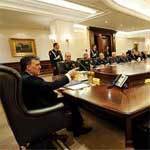Turkey's Human Rights Association (TİHV) chair Yavuz Önen sees a correlation between the army's esteem in duty to intervene in social life in Turkey and the dialogues with generals on preparing a coup in a recently revealed diary of a journalist.
"National Security Council (MGK) General Secretary acted as the executive body for years. During the period following the intervention on February 28 1997, the main risk perception of the army was against Islamic and anti-laic currents. Now, the ruling Justice and Development Party (AKP) takes on this assault."
Two documents revealed in connection to the ongoing Ergenekon case, retired admiral Özden Örnek's diaries and journalist Mustafa Balbay's alleged diaries include coup-d'etat plans by high-ranking officers.
Önen recalls the political atmosphere of that period, 2003 and 2004 as follows:
EU support to AKP: Democratization process gained momentum and reforms for the EU accession ensued during that period. It was supposed that the AKP, as a mild Islamist party would democratize the country. The EU and its members also have a share in the creation of this perception. In fact, AKP's the last ring of the Islamist movement, which gained stranght since 1950s. It was also supposed to integrate Turkey into the new global economic system, to neo-liberalism. They accomplished this latter part perfectly. Between 2002 and 2005, the Islamist movement in Turkey was supported in those manners.
Military's response: Following February 28th, the army got into conflict not only with AKP, but also with the EU. They were totally in discomfort, so to say. Now we see that this process also caused a divide at the command line and some of the generals tried to form a new programme.
Social base: We must also see that there was public support behind the army at this point. The anti-EU reaction grew during that period among people. Educated during that period, those masses later became visible at Republican Meetings. (TK/AGÜ)













